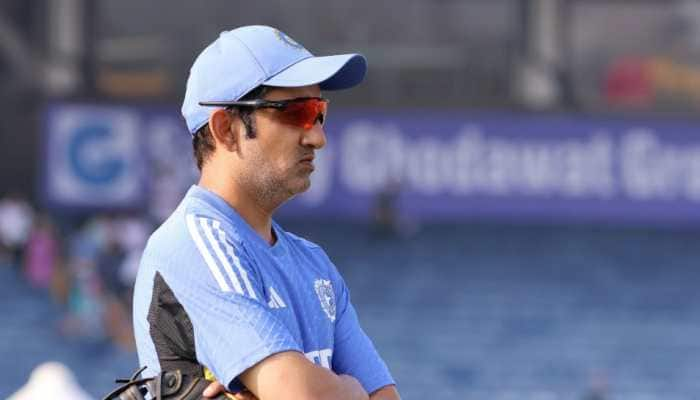Delhi Govt Calls Meeting To Ensure Compliance Of SC Order As Air Quality Remains 'Severe'
According to the Delhi Pollution Control Committee (DPCC), pollution peaks in the national capital from November 1 to November 15 when the number of stubble-burning incidents in Punjab and Haryana rises.
Trending Photos
)
NEW DELHI: Delhi Environment Minister Gopal Rai has called a meeting of all concerned departments on Wednesday to ensure compliance with the instructions given by the Supreme Court yesterday regarding air pollution. Delhi Transport Minister Kailash Gahlot and Revenue Minister Atishi will also attend this meeting: Office of Environment Minister. Reacting to the Supreme Court's directions on air pollution, Delhi Environment Minister Gopal Rai said, "The Supreme Court has given its observations of what needs to be implemented in Delhi & we have called for a meeting with the concerned ministers and officers so that we can implement whatever instructions Delhi has got. The SC has given the order to end stubble burning in whichever state it has been happening..."
#WATCH | On the Supreme Court's directions on pollution, Delhi Environment Minister Gopal Rai says, "The Supreme Court has given its observations of what needs to be implemented in Delhi & we have called for a meeting with the concerned ministers and officers so that we can… pic.twitter.com/zCGvnDx5lh — ANI (@ANI) November 8, 2023
Delhi Environment Minister also slammed opposition parties over intense blame game and politics over the pollution crisis. Rai further said, "...All the parties be it BJP, Congress or AAP everyone will have to try (to curb) it together. It is sad that BJP thinks that it is important to release a statement..."
Rai said this in response to Haryana CM Manohar Lal Khattar's remarks, "It's unfortunate that some do politics on it. Any politics on this is not giving them any benefit instead it's affecting them. We have controlled a lot in Haryana...Stubble has become a commercial product and it holds a value. I appeal to Delhi CM Arvind Kejriwal and Punjab CM Bhagwant Mann that we are available to help them. It's not a political issue."
Delhi Air Quality Remains 'Severe'
Air quality in Delhi and its suburbs dropped to the severe category again on Wednesday morning, with smoke from post-harvest paddy straw burning in neighbouring states accounting for one-third of the air pollution in the national capital. According to the Central Pollution Control Board, there is no respite for residents in the national capital as the air quality in Delhi continued to remain in the 'severe' category on Wednesday morning.
The city's Air Quality Index (AQI) stood at 421, worsening from 395 at 4 pm on Tuesday. AQI in Anand Vihar was recorded at 452, in RK Puram at 433, in Punjabi Bagh at 460 and in ITO at 413.
Despite a marginal dip, the concentration of PM2.5, fine particulate matter capable of penetrating deep into the respiratory system and triggering health problems, exceeded the government-prescribed safe limit of 60 micrograms per cubic metre by seven to eight times in the capital.
It was 30 to 40 times the healthy limit of 15 micrograms per cubic metre set by the World Health Organisation (WHO). Several cities across the Indo-Gangetic plains reported hazardous air quality. Neighbouring Ghaziabad (382), Gurugram (370), Noida (348), Greater Noida (474), and Faridabad (396) also reported hazardous air quality.
According to data from the Decision Support System, a numerical model-based framework capable of identifying sources of particulate matter pollution in Delhi, stubble burning in neighbouring states, especially Punjab and Haryana, accounted for 37 per cent of the air pollution in Delhi on Tuesday. It is likely to be 33 per cent on Wednesday.
Return Of Odd-Even Rule
The Delhi government on Monday announced the return of its flagship odd-even scheme after four years anticipating further deterioration of air quality post-Diwali. The odd-even scheme, under which cars are allowed to operate on alternate days based on their odd or even number plates, will be implemented between November 13 and November 20. The Energy Policy Institute at the University of Chicago (EPIC) and Evidence for Policy Design analysed the impact of the odd-even system in 2016 and found that Delhi saw a 14-16 per cent reduction in PM2.5 levels during the hours it remained in force in January that year. However, there was no reduction in pollution when the scheme was brought back in April that year.
To protect the health of school children, the government also decided to suspend in-person classes in all schools, except for students in grades X and XII preparing for board exams, until November 10.
According to the Ministry of Earth Sciences' Air Quality Early Warning System for Delhi-NCR, the region is likely to experience severe air quality for another five to six days. Doctors say breathing in the polluted air of Delhi is equivalent to the harmful effects of smoking approximately 10 cigarettes a day.
Prolonged exposure to high levels of pollution can cause or exacerbate respiratory problems such as asthma, bronchitis, and chronic obstructive pulmonary disease (COPD) and can dramatically raise the risk of cardiovascular disease, said Rajesh Chawla, senior consultant in pulmonology and critical care at the Indraprastha Apollo Hospital.
Stringent restrictions mandated under the final stage of the Central government's air pollution control plan for Delhi-NCR called the Graded Response Action Plan (GRAP), have also been implemented in Delhi.
GRAP Stage 4 Curbs In Delhi
The restrictions under stage IV of GRAP, including a ban on all kinds of construction work and the entry of polluting trucks into the capital, took effect on Sunday after air quality in the capital dropped to severe plus (AQI above 450) levels. GRAP categorises actions into four stages: Stage I - Poor (AQI 201-300); Stage II - Very Poor (AQI 301-400); Stage III - Severe (AQI 401-450); and Stage IV - Severe Plus (AQI above 450).
Unfavourable meteorological conditions, combined with vehicular emissions, paddy straw burning, firecrackers, and other local pollution sources, contribute to hazardous air quality levels in Delhi-NCR during the winter every year.
According to the Delhi Pollution Control Committee (DPCC), pollution peaks in the national capital from November 1 to November 15 when the number of stubble-burning incidents in Punjab and Haryana rises.
Air quality in Delhi-NCR declined over the last two weeks due to a gradual drop in temperatures, calm winds that trap pollution, and a surge in post-harvest paddy straw burning across Punjab and Haryana. Delhi's air quality ranks among the worst in the world's capital cities. A report by EPIC in August said that air pollution is shortening lives by almost 12 years in Delhi.
Stay informed on all the latest news, real-time breaking news updates, and follow all the important headlines in india news and world News on Zee News.
Live Tv







)
)
)
)
)
)
)
)
)
)
